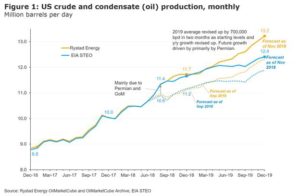Rystad Energy: What’s at stake in Vienna

US production at $50 WTI levels would remove only 0.4 million BPD of the looming 1.5 million BPD surplus in the balances that Rystad Energy, an independent energy consulting services and business intelligence data firm, forecasts for 2019 in a status quo scenario.
“We believe a cut announcement that effectively removes anything less than 1 million BPD of 2019 supply would be interpreted negatively by the market,” Bjornar Tonhaugen, Head of Oil Market Research at Rystad Energy, said.
Mr Tonhaugen says the market is now at the mercy of OPEC and the 10 non-OPEC countries that have previously agreed to curb production.

“To surprise the market in a bullish fashion, we believe cuts approaching 2 million BPD would have to be announced. Should OPEC+ announce a 1.5 million BPD cut, we believe the market reaction would be neutral at first, but gradually pave the way for a recovery in oil prices above the $70 level for Brent in 2019,” Mr Tonhaugen adds.
At the 175th (Ordinary) OPEC Meeting that opened in Vienna 6 December 2018, OPEC+ producers face a recurring dilemma: US shale oil production is again growing too fast, just as it did in 2014. The reality is that back in May 2018, when the US announced re-imposing sanctions on Iran, OPEC+ agreed to increase production to compensate for the future supply losses from Iran (and Venezuela). The prevalent view in the market at the time was that US production growth would be constrained, owing to take-away bottlenecks in the Permian Basin.
Rystad Energy argued at the time that US production would manage to continue growing robustly through 2018, as could be seen through the company’s well-by-well data coverage. But Rystad Energy forecasts – while higher than those of OPEC, the EIA and the market in general – still underestimated the supply growth from the US.
“Should OPEC+ decide this week not to cut production substantially, the market can probably wave goodbye to any hopes of short term recovery in prices from current levels, and more likely say hello to even lower levels for parts of next year. All eyes on Vienna,” Mr Tonhaugen said.




